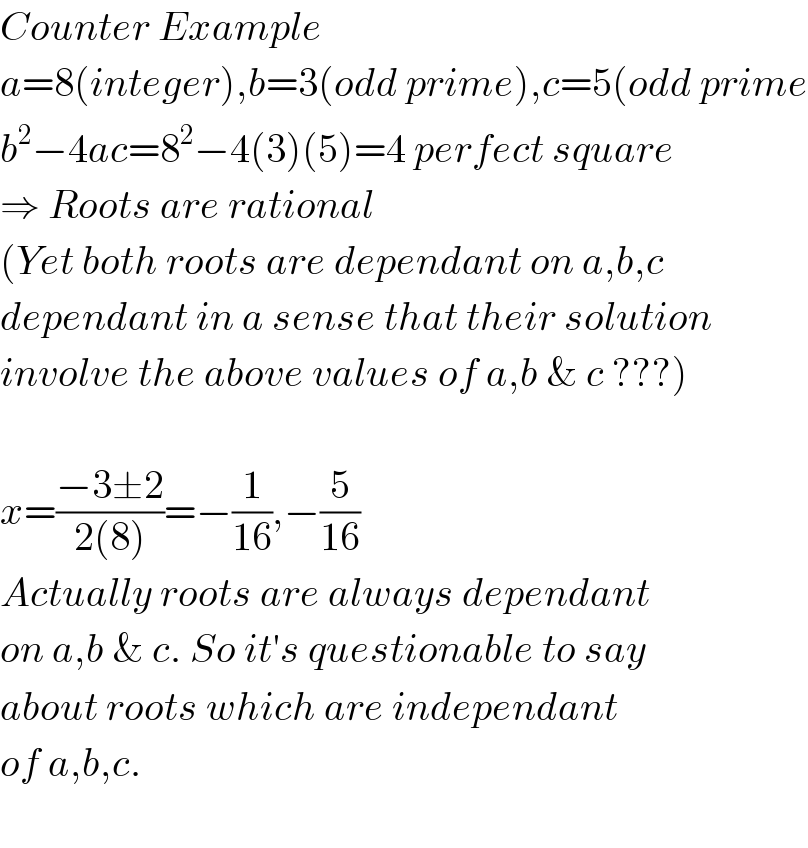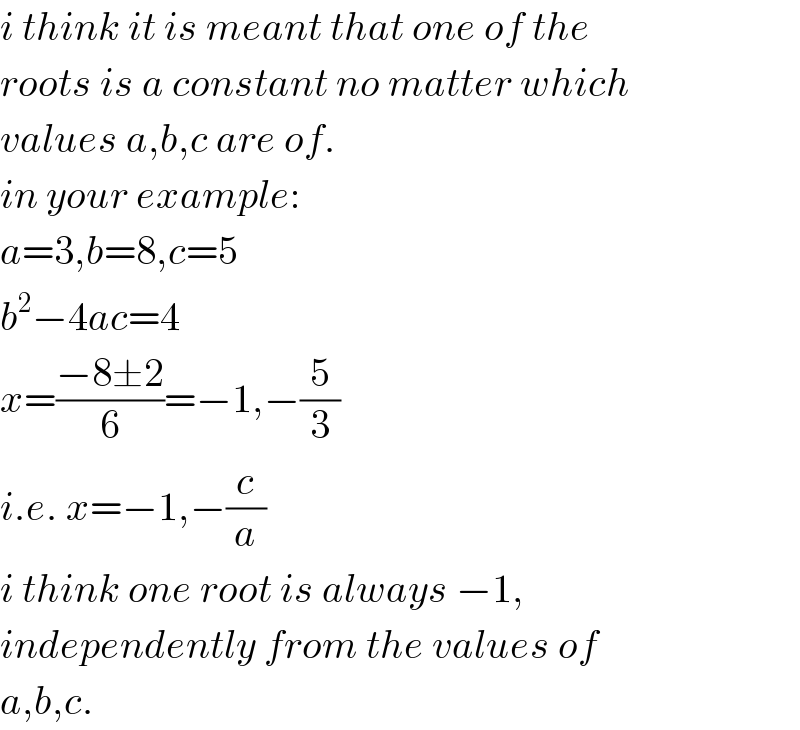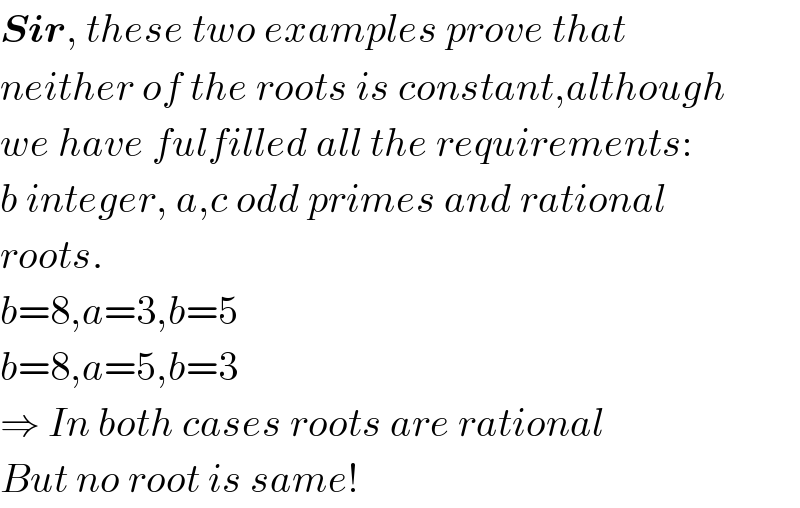Question Number 62672 by bshahid010@gmail.com last updated on 24/Jun/19

Commented by Rasheed.Sindhi last updated on 24/Jun/19

$$\mathrm{b}\in\mathrm{I},\:\mathrm{I}\:{means}\:{irrational}? \\ $$
Commented by mr W last updated on 24/Jun/19

$${i}\:{think}\:{he}\:{means}\:{integers}. \\ $$
Commented by MJS last updated on 24/Jun/19

$$\mathrm{I}\:\mathrm{don}'\mathrm{t}\:\mathrm{understand}.\:\mathrm{what}\:\mathrm{does}\:“\mathrm{independent}'' \\ $$$$\mathrm{mean}?\:\mathrm{what}\:\mathrm{does}\:{b}\in\mathbb{I}\:\mathrm{mean}? \\ $$
Commented by mr W last updated on 24/Jun/19

$${rasheed}\:{sir}:\:{can}\:{you}\:{give}\:{a}\:{solution} \\ $$$${to}\:{this}\:{question}?\:{assume}\:{b}={integer}. \\ $$
Commented by bshahid010@gmail.com last updated on 24/Jun/19

$$\mathrm{Here}\:\mathrm{I}\:\mathrm{means}\:\mathrm{integer}\:\mathrm{which}…\mathrm{I}\:\mathrm{denotes}\:\mathrm{the}\:\mathrm{set}\:\mathrm{of}\:\mathrm{Integers}. \\ $$$$\mathrm{Independent}\:\mathrm{means}\:\mathrm{that}\:\mathrm{should}\:\mathrm{not}\:\mathrm{be}\:\mathrm{related}\:\mathrm{to}\:\mathrm{each} \\ $$$$\mathrm{other}\:\mathrm{anyways} \\ $$
Commented by Rasheed.Sindhi last updated on 24/Jun/19

$${Counter}\:{Example} \\ $$$${a}=\mathrm{8}\left({integer}\right),{b}=\mathrm{3}\left({odd}\:{prime}\right),{c}=\mathrm{5}\left({odd}\:{prime}\right. \\ $$$${b}^{\mathrm{2}} −\mathrm{4}{ac}=\mathrm{8}^{\mathrm{2}} −\mathrm{4}\left(\mathrm{3}\right)\left(\mathrm{5}\right)=\mathrm{4}\:{perfect}\:{square} \\ $$$$\Rightarrow\:{Roots}\:{are}\:{rational} \\ $$$$\left({Yet}\:{both}\:{roots}\:{are}\:{dependant}\:{on}\:{a},{b},{c}\right. \\ $$$${dependant}\:{in}\:{a}\:{sense}\:{that}\:{their}\:{solution} \\ $$$$\left.{involve}\:{the}\:{above}\:{values}\:{of}\:{a},{b}\:\&\:{c}\:???\right) \\ $$$$ \\ $$$${x}=\frac{−\mathrm{3}\pm\mathrm{2}}{\mathrm{2}\left(\mathrm{8}\right)}=−\frac{\mathrm{1}}{\mathrm{16}},−\frac{\mathrm{5}}{\mathrm{16}} \\ $$$${Actually}\:{roots}\:{are}\:{always}\:{dependant} \\ $$$${on}\:{a},{b}\:\&\:{c}.\:{So}\:{it}'{s}\:{questionable}\:{to}\:{say} \\ $$$${about}\:{roots}\:{which}\:{are}\:{independant} \\ $$$${of}\:{a},{b},{c}. \\ $$$$ \\ $$
Commented by mr W last updated on 24/Jun/19

$${i}\:{think}\:{it}\:{is}\:{meant}\:{that}\:{one}\:{of}\:{the} \\ $$$${roots}\:{is}\:{a}\:{constant}\:{no}\:{matter}\:{which} \\ $$$${values}\:{a},{b},{c}\:{are}\:{of}. \\ $$$${in}\:{your}\:{example}: \\ $$$${a}=\mathrm{3},{b}=\mathrm{8},{c}=\mathrm{5} \\ $$$${b}^{\mathrm{2}} −\mathrm{4}{ac}=\mathrm{4} \\ $$$${x}=\frac{−\mathrm{8}\pm\mathrm{2}}{\mathrm{6}}=−\mathrm{1},−\frac{\mathrm{5}}{\mathrm{3}} \\ $$$${i}.{e}.\:{x}=−\mathrm{1},−\frac{{c}}{{a}} \\ $$$${i}\:{think}\:{one}\:{root}\:{is}\:{always}\:−\mathrm{1}, \\ $$$${independently}\:{from}\:{the}\:{values}\:{of} \\ $$$${a},{b},{c}. \\ $$
Commented by Rasheed.Sindhi last updated on 24/Jun/19

$$\boldsymbol{{Sir}},\:{these}\:{two}\:{examples}\:{prove}\:{that} \\ $$$${neither}\:{of}\:{the}\:{roots}\:{is}\:{constant},{although} \\ $$$${we}\:{have}\:{fulfilled}\:{all}\:{the}\:{requirements}: \\ $$$${b}\:{integer},\:{a},{c}\:{odd}\:{primes}\:{and}\:{rational} \\ $$$${roots}. \\ $$$${b}=\mathrm{8},{a}=\mathrm{3},{b}=\mathrm{5} \\ $$$${b}=\mathrm{8},{a}=\mathrm{5},{b}=\mathrm{3} \\ $$$$\Rightarrow\:{In}\:{both}\:{cases}\:{roots}\:{are}\:{rational} \\ $$$${But}\:{no}\:{root}\:{is}\:{same}! \\ $$
Commented by MJS last updated on 24/Jun/19
![a=p c=p±2n b=±2(n+p) ⇒ x=∓1∨x=∓((2n+p)/p) b=±[p(2n+p)+1] ⇒ x=∓(2n+p)∨x=∓(1/p)](https://www.tinkutara.com/question/Q62729.png)
$${a}={p}\:{c}={p}\pm\mathrm{2}{n} \\ $$$$\:\:\:\:\:{b}=\pm\mathrm{2}\left({n}+{p}\right)\:\Rightarrow\:{x}=\mp\mathrm{1}\vee{x}=\mp\frac{\mathrm{2}{n}+{p}}{{p}} \\ $$$$\:\:\:\:\:{b}=\pm\left[{p}\left(\mathrm{2}{n}+{p}\right)+\mathrm{1}\right]\:\Rightarrow\:{x}=\mp\left(\mathrm{2}{n}+{p}\right)\vee{x}=\mp\frac{\mathrm{1}}{{p}} \\ $$
Answered by mr W last updated on 24/Jun/19

$${x}=\frac{−{b}\pm\sqrt{{b}^{\mathrm{2}} −\mathrm{4}{ac}}}{\mathrm{2}{a}}=\frac{−{b}\pm{n}}{\mathrm{2}{a}} \\ $$$${b}^{\mathrm{2}} −\mathrm{4}{ac}={n}^{\mathrm{2}} ,\:{say} \\ $$$${b}^{\mathrm{2}} −{n}^{\mathrm{2}} =\mathrm{4}{ac} \\ $$$$\left({b}−{n}\right)\left({b}+{n}\right)=\mathrm{4}{ac}=\mathrm{2}^{\mathrm{2}} {a}^{\mathrm{1}} {c}^{\mathrm{1}} \\ $$$$\Rightarrow{b}\:{and}\:{n}\:{must}\:{be}\:{both}\:{even}\:{or}\:{odd}. \\ $$$${i}.{e}.\:{b}−{n}\:{and}\:{b}+{n}\:{must}\:{be}\:{even}. \\ $$$${since}\:{a}\:{and}\:{c}\:{are}\:{odd}\:{primes},\:{RHS} \\ $$$${has}\:\mathrm{3}×\mathrm{2}×\mathrm{2}=\mathrm{12}\:{factors},\:{or}\:{it}\:{can} \\ $$$${be}\:{expressed}\:{as}\:{the}\:{product}\:{of}\:{two} \\ $$$${numbers}\:{in}\:\mathrm{6}\:{ways}: \\ $$$$\mathrm{4}{ac}=\mathrm{1}×\mathrm{4}{ac}=\mathrm{2}×\mathrm{2}{ac}=\mathrm{4}×{ac}={a}×\mathrm{4}{c}=\mathrm{2}{a}×\mathrm{2}{c}=\mathrm{4}{a}×{c} \\ $$$$ \\ $$$${case}\:\mathrm{1}:\:\begin{cases}{{b}−{n}=\mathrm{1}\:\Rightarrow\:{bad}!}\\{{b}+{n}=\mathrm{4}{ac}}\end{cases} \\ $$$${case}\:\mathrm{2}:\:\begin{cases}{{b}−{n}=\mathrm{2}\:\Rightarrow\:{b}={ac}+\mathrm{1},\:{n}={ac}−\mathrm{1}}\\{{b}+{n}=\mathrm{2}{ac}}\end{cases} \\ $$$${case}\:\mathrm{2}':\:\begin{cases}{{b}−{n}=\mathrm{2}{ac}\:\Rightarrow\:{b}={ac}+\mathrm{1},\:{n}=\mathrm{1}−{ac}}\\{{b}+{n}=\mathrm{2}}\end{cases} \\ $$$${case}\:\mathrm{3}:\:\begin{cases}{{b}−{n}=\mathrm{4}}\\{{b}+{n}={ac}\:\Rightarrow\:{bad}!}\end{cases} \\ $$$${case}\:\mathrm{4}:\:\begin{cases}{{b}−{n}={a}\:\Rightarrow\:{bad}!}\\{{b}+{n}=\mathrm{4}{c}}\end{cases} \\ $$$${case}\:\mathrm{5}:\:\begin{cases}{{b}−{n}=\mathrm{2}{a}\:\Rightarrow\:{b}={c}+{a},\:{n}={c}−{a}}\\{{b}+{n}=\mathrm{2}{c}}\end{cases} \\ $$$${case}\:\mathrm{5}':\:\begin{cases}{{b}−{n}=\mathrm{2}{c}\:\Rightarrow\:{b}={c}+{a},\:{n}={a}−{c}}\\{{b}+{n}=\mathrm{2}{a}}\end{cases} \\ $$$${case}\:\mathrm{6}:\:\begin{cases}{{b}−{n}=\mathrm{4}{a}}\\{{b}+{n}={c}\:\Rightarrow\:{bad}!}\end{cases} \\ $$$${we}\:{see}\:{only}\:{case}\:\mathrm{2}\:{and}\:{case}\:\mathrm{5}\:{are}\:{suitable}. \\ $$$$ \\ $$$${from}\:{case}\:\mathrm{2}+\mathrm{2}': \\ $$$${b}={ac}+\mathrm{1} \\ $$$${x}=\frac{−{b}\pm{n}}{\mathrm{2}{a}}=\frac{−{ac}−\mathrm{1}\pm\left(\mathrm{1}−{ac}\right)}{\mathrm{2}{a}}=\begin{cases}{−\frac{\mathrm{1}}{{a}}}\\{−{c}}\end{cases} \\ $$$${from}\:{case}\:\mathrm{5}+\mathrm{5}': \\ $$$${b}={a}+{c} \\ $$$${x}=\frac{−{b}\pm{n}}{\mathrm{2}{a}}=\frac{−{c}−{a}\pm\left({c}−{a}\right)}{\mathrm{2}{a}}=\begin{cases}{−\mathrm{1}}\\{−\frac{{c}}{{a}}}\end{cases} \\ $$$$ \\ $$$${summary}: \\ $$$${to}\:{fulfill}\:{the}\:{condictions},\:{b}\:{must} \\ $$$${be}\:{ac}+\mathrm{1}\:{or}\:{a}+{c}.\:{with}\:{b}={a}+{c},\:{one} \\ $$$${root}\:{is}\:{always}\:−\mathrm{1}.\:{but}\:{with}\:{b}={ac}+\mathrm{1}, \\ $$$${both}\:{roots}\:{are}\:{dependent}\:{from}\:{a}\:{and}\:{c}, \\ $$$${that}\:{is}\:{to}\:{say}\:{the}\:{question}\:{is}\:{not} \\ $$$${correct}! \\ $$
Commented by Rasheed.Sindhi last updated on 24/Jun/19

$${Matchless}\:{approach}\:{Sir}! \\ $$
Commented by mr W last updated on 24/Jun/19

$${thanks}\:{sir}!\:{but}\:{i}\:{just}\:{proved}\:{that}\:{the} \\ $$$${question}\:{is}\:{not}\:{correct}. \\ $$
